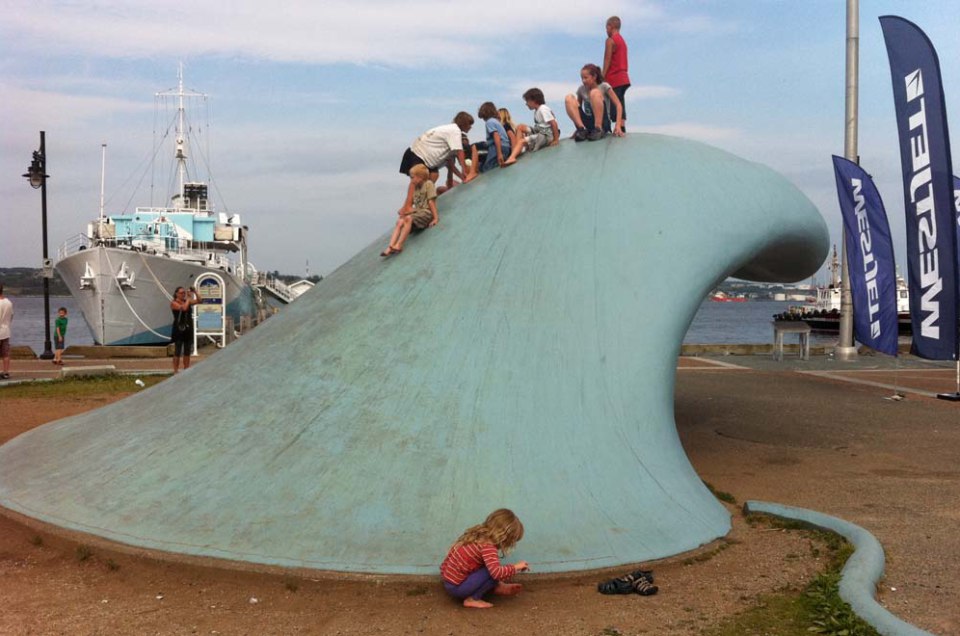Like most cities, Halifax has its own language that makes total sense to locals but can be confusing for those new to the city. Here’s a primer so that you’ll be in the know before you arrive.
1) The Dark Side
This is commonly used (and not very complimentary) slang for Dartmouth, the city just across the harbor from Halifax and reached by one of the city’s two bridges. Dartmouth used to have a bit of a rep for being rough, or as Halifax’s poorer relation and Haligonians tend to feel a little superior for living on their side of the harbour (where property prices are higher and there are fewer “sketchy” neighbourhoods). In truth, Dartmouth has changed a lot in recent years, has a rapidly evolving downtown core and some of the best shopping in Nova Scotia (Mic Mac Mall and Dartmouth Crossing are a shopping addict’s dream come true).
2) Kitchen party
When someone invites you to a kitchen party, there’s nothing culinary about it (although you may be offered a plate of pepperoni and cheese, a common party snack in these parts). People here use the term kitchen party to describe any gathering that involves music, fun and good company – because traditionally these ended up happening in the party host’s kitchen after folks dropped by. You’ll see community events advertised as kitchen parties, and it may describe anything from an informal jam session to a variety night.
3) The BLIP
The BLIP refers to the Bayers Lake Industrial Park, which is a massive strip mall as much as it is an industrial park. Here you’ll find all the major big box stores, a few discount outlets, one of Halifax’s biggest movie theatres and dozens of restaurants.
4) Pizza Corner
At the corner of Grafton and Blowers streets, in downtown Halifax, you’ll find pizza joints (where you can also get donnairs, falafels and all kinds of other takeout) that are open ‘til the wee hours, which makes this a busy and somewhat chaotic spot once the bars kick out. Locals have been calling this cross-street Pizza Corner for a very long time.
5) Dharma brats
Halifax has a massive Shambhala Buddhist population, and even has it’s own school for Buddhist (and non Buddhist) children, the Shambala School (which caters for kids from kindergarten up through high school). The school is artsy and well regarded, Halifax’s very own movie star Ellen Paige (star of Inception and Juno, to name a few of her movies) attended the Shambala School. Some of the non-Buddhist population of Halifax refer to the juvenile Buddhist population of Halifax as Dharma Brats (eye rolling using accompanies this descriptor).
6) TPB
When someone says TPB, they are referring to the extremely popular locally produced television series Trailer Park Boys, which was a mockumentary series following the exploits of a bunch of dope dealing trailer park inhabitants. If you are a fan of the show, you’ll recognize lots of locations around town, and if you head to Bubba Ray’s Sports Bar you may even get to meet one of the stars of the series, Mike Smith, who played the hilarious Bubbles, as he is part owner of the bar.
7) CFA
Pretty much anyone from outside Nova Scotia is referred to as a CFA, which stands for Come From Away. In some cases, this label is even given to those from Cape Breton, despite the fact that the island is part of Nova Scotia.
8) Northenders and Southenders
Although this descriptor refers to those that live in the north and south ends of Halifax, they tend to carry a deeper meaning than just geography. Traditionally, Northenders are considered scrappy and perhaps a little rough around the edges and South Enders are considered wealthier and more gentile. In truth, gentrification of the North End means that there is plenty of wealth there too, but the reputation remains.
9) The “Old Bridge” and the “New Bridge”
Locals refer to the MacDonald Bridge as the old bridge, because it was built first, and the MacKay Bridge as the new bridge, because it was built later. Both bridges connect Halifax to Dartmouth.
10) Bluenosers
Locals refer to themselves as Bluenosers, and you’ll see the word incorporated into local business names too. The term has been used to describe Nova Scotians since the 18th century, when the newly arrived British loyalists used it to describe the long-time residents of the area, and there are some great explanations of the history of the moniker on the Nova Scotian government website.
